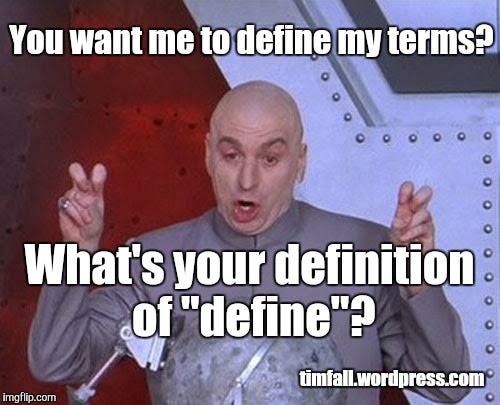Written by Matthew Archer.
Below are three arguments. I want you to think about whether the conclusions follow from the given premises.
(1) All drugs that are dangerous should be illegal. Marijuana is a drug that is dangerous. Therefore, Marijuana should be illegal.
(2) Judge Wilson believes that if a living thing is not a person, then one has the right to end its life. She also believes that a foetus is a person. Therefore, Judge Wilson concludes that no one has the right to end the life of a foetus.
(3) All white people have “white privilege”. Jack is a white, disabled, homeless war veteran. Therefore, Jack has white privilege.
Scroll for the answers.
-
-
-
-
The answers: (1) & (3) are logically valid, which is to say that the conclusion flows from the premises. An elementary logical fact: the premises don’t have be true for the conclusion to logically follow. But readers of this blog probably know that, of course.
It turns out that many people struggle with this decoupling task because their political ideology blinds their reasoning abilities. At least, that’s the finding of a paper with a brilliant title: (Ideo)Logical Reasoning. The authors note:
Committed partisans evaluate the same scientific evidence as more valid when it supports rather than challenges their political views, they evaluate the identical policy more favourably if they believe their own party supports it rather than the opposing party and they even see less violence in the same video of a political demonstration if they support the cause of the protest than if they oppose it.
Obviously, the three arguments I gave you all had a particular political slant, which I imagine most of my audience doesn’t endorse. The authors carried out three similar experiments, where they first measured people’s political ideology, then trained participants in logical reasoning, and finally gave them arguments which went against their own political ideology, as well as a control argument to compare it to.
You have to be pretty good at detaching from the emotion of those arguments in order to evaluate them rationally. What’s more, being intelligent doesn’t seem to help. If anything, the smarter you are, the better you are at defending the side you already agree with. People who can consistently pierce through the veil of ideology are high decouplers. If you got all three correct, you’re likely to be one. The term comes from John Nerst. Tom Chivers has a good write up on decoupling using the example Richard Dawkins’ infamous eugenics Tweet below:
Take another example:
All Jews are rats. Rats should be killed. Therefore, all Jews should be killed.
Unless you are autistic (which is to say a hyper systemiser and extreme decoupler), such words are likely to make you cringe.
As Chivers, referring to Dawkins’ Tweet, writes:
…many people reading it are not high-decouplers; they hear “eugenics” and “work” and immediately all of the history, from Francis Galton to Josef Mengele, is brought into the discussion: you can’t separate the one from the other.
I think a lot of arguments in society come down to this high-decoupler/low-decoupler difference.
Indeed, I’ve previously written about the rather bizarre emotional saliency of the word ‘eugenics’ to radical leftists, where to even talk about twin studies is to engage in eugenic (and therefore racist) discourse:
This isn’t to say that low-decoupling is an intrinsically bad thing. Perhaps there’s an argument to be made for a kind of yin-yang benefit to humanity by having a mix of high and low decouplers. Perhaps, for example, no work would ever get done if we stopped to question every single premise and definition. Perhaps low-decouplers are useful for spotting actually racist content.
But these three experiments do show that low decouplers aren’t going to be great logicians. And if that’s about half the population, then we’re probably dismissing good ideas all the time simply because they’re contaminated by the out-group.
What’s interesting is that the researchers also found that liberals are better at identifying flawed arguments supporting conservative beliefs and conservatives were better at identifying flawed arguments supporting liberal beliefs. Yin and Yang.
They conclude with an appeal for epistemologically humility:
If logical reasoning is to serve as the antidote to the poison of partisan gridlock, we must begin by acknowledging that it does not merely serve our objectivity, but also our biases.
Amen.
Matthew Archer is the Editor-in-Chief of Aporia.















